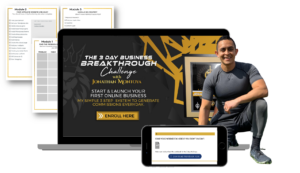In recent years, the corporate world has witnessed a paradigm shift, with many employees opting to leave behind their stable jobs in pursuit of new ventures.
This growing trend is largely influenced by the availability of several opportunities that allow individuals to start fresh, even with little to no experience in new fields.
This phenomenon is being referred to as the “No-Experience” Blueprint, and it is becoming increasingly influential in the professional lives of many corporate workers.
What makes this Blueprint so compelling?
How exactly does it empower the daring step of leaving behind the traditional corporate path?
Let’s explore the various facets of this emerging trend.
At the core of the No-Experience Blueprint is the concept of self-reinvention.
Many corporate workers find themselves in careers that no longer provide the challenge or fulfillment they once sought.
The Blueprint offers a perspective that encourages professionals to view their existing skills as transferable while learning new skills on the go.
This self-reinvention starts with a mindset shift, moving from a fear of the unknown to an embrace of opportunities in different sectors where they can thrive.
One key driver of the No-Experience movement is the rise of digital platforms and the gig economy.
The internet has democratized access to information and resources that were once restricted to those with specialized training or degrees.
Now, anyone with a laptop and an internet connection can self-study, network, and even launch a business.
Online educational platforms offer a plethora of courses that bring skills and knowledge directly to the learner, whether it’s coding, digital marketing, graphic design, or any number of vocational skills.
Many of these platforms also provide certification programs which, while not replacing formal education, create a credible way for individuals to show their commitment to learning new skills.
Furthermore, the gig economy offers an environment where corporate workers can make a transitional shift without the need for an all-or-nothing commitment.
Side gigs allow many professionals to test the waters in a new field while maintaining their current position.
This dual approach reduces the financial risk and gives a real-world perspective on what life might be like should they decide to make the leap fully.
The availability of freelance marketplaces such as Upwork, Fiverr, and similar sites enables individuals to find work that complements their new skill set and passion.
In contrast to traditional employment, which often demands strict adherence to specific qualifications and experience, the acceptance criteria in the gig economy are centered around delivering tangible results.
This aspect is particularly appealing for those who are driven and eager to prove their capabilities, even if it means starting at a lower rate than someone with more years on paper.
The opportunity to build a portfolio of work that can be exhibited is another motivating factor, adding a sense of ownership and growth that many corporate workers find lacking in their closed-office environment.
Corporate workers are also influenced by the allure of entrepreneurship.
The No-Experience Blueprint highlights that significant success does not always demand prior expertise in a specific domain.
Rather, it emphasizes problem-solving, innovation, and strategic thinking.
The stories of successful entrepreneurs combine to form a prolific narrative in popular culture, inspiring a can-do attitude.
For many, the aim isn’t necessarily to create a multi-million dollar company but rather to establish a business that aligns with personal values and goals, offering autonomy and a departure from the sometimes-suffocating hierarchical structures of large corporations.
Despite the excitement, it is vital to address the less glamorous sides of the No-Experience journey.
It is not devoid of challenges and insecurities.
Corporate workers contemplating this shift need to prepare for uncertainty, including periods of instability or slower-than-anticipated progress.
However, the very nature of this endeavor means embracing challenges as part of the adventure.
Facing these challenges can lead to breakthrough insights and personal growth, often turning perceived weaknesses into strengths.
Mentorship and community have become crucial elements that support those embarking on the No-Experience path.
Joining communities, both online and offline, where like-minded individuals gather to exchange knowledge and experiences can provide the support system many need, especially in the early stages.
Mentors, on the other hand, offer guidance and share lessons from their experience, helping to avoid potential pitfalls and providing reassurance during challenging times.
As more corporate workers turn to this Blueprint, we may see a redefinition of what a “career” means in the modern world.
As organizations become more aware of this trend, there is a potential for them to adapt to retain talent that craves variety and opportunities for development.
However, it’s a delicate balance – not every corporation is equipped for the rapid change this involves, nor do they always provide the support or flexibility that high-performing employees now expect.
For corporate workers considering this leap, the most important step is introspection.
Understanding personal drivers, strengths, weaknesses, and what one truly wants from their career is essential.
Is it financial freedom, flexibility, passion-driven work, or the ability to balance personal life with professional aspirations?
This understanding can shape whether the No-Experience Blueprint is the right fit.
Coupled with an action plan, it can transform idealistic visions into achievable goals.
In conclusion, the No-Experience Blueprint represents more than just a career change; it represents a shift in values and priorities.
It challenges the traditional view of success and instead focuses on personal fulfillment, skill acquisition, and the empowerment to chart one’s own path.
For those corporate workers considering such a move, this Blueprint offers hope and a tangible way forward, encouraging them to redefine their professional narratives and, ultimately, their lives.
Though the road is less traveled and often fraught with ambiguity, it is precisely this unpredictability that gives it life, offering a promise of discovery and potential unlike any other.









